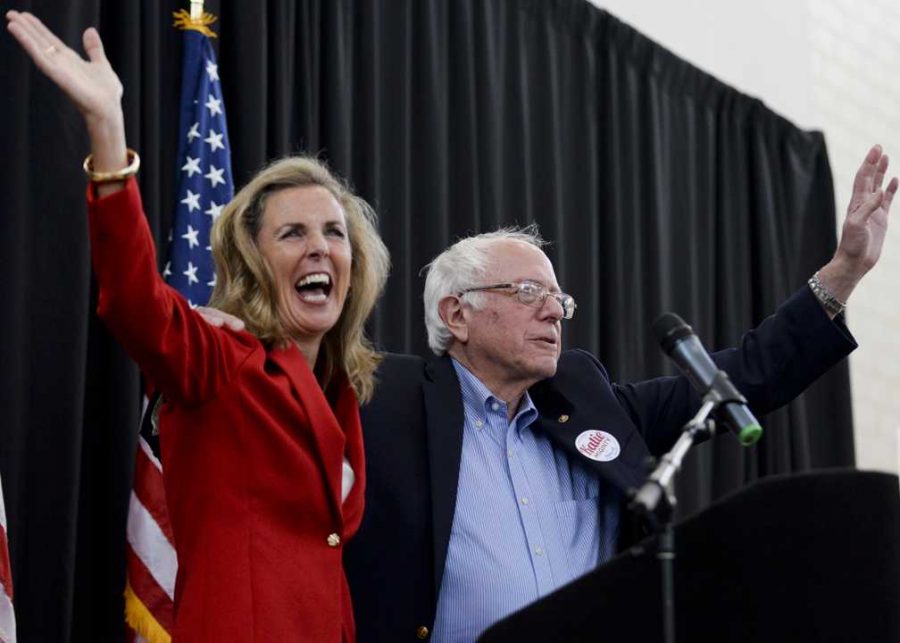Three unlikely Democratic allies gathered together Friday afternoon in Carnegie Mellon University’s Wiegand Gymnasium to speak, one after another, despite the fact that they wouldn’t have dared standing shoulder to shoulder in April.
The three politicians standing on stage were Pennsylvania Senate candidate Katie McGinty, her former primary opponent, Braddock mayor John Fetterman, and his political touchstone, Sen. Bernie Sanders, I-Vt. The fact that the politicians onstage weren’t lobbing insults against each other would have seemed strange just months ago.
Instead, both Fetterman and Sanders were appearing together to boost McGinty’s bid for the Senate seat of Pat Toomey, R-Pa. The message from the speakers was clear: Pennsylvania Democrats cannot allow intraparty differences, both personal and ideological, to help Toomey keep his seat and maintain GOP control of the Senate.
This primary season, Republican and Democratic sides alike saw no shortage of sharp character distinctions. While some of the resulting intraparty clashes focused on policy — Donald Trump’s proposal to build a wall on the Mexican border and Hillary Clinton’s perceived reliance on hawkish diplomacy, for example — many clashes have focused on personal characteristics.
Both Sanders and Fetterman used McGinty’s and Clinton’s histories of “shady” partnerships with big business to paint the candidates as untrustworthy. The Braddock mayor’s campaign prominently accused McGinty of receiving money from energy groups, and the middle of the presidential primary saw Sanders spokesman Michael Briggs claim that Clinton “relied heavily on funds from lobbyists working for the oil, gas and coal industry.”
Fetterman and Sanders both used this angle to question whether their respective opponents could understand the problems of middle- and working-class Americans. Throughout the primaries, these contests were about relatability and personal trust.
Now, the primary season scuffles have been put aside to deal with the task at hand: beating Toomey. Listening to Fetterman speak at last Friday’s rally, it was obvious that, to him, campaign-specific issues like fossil fuel donations matter much less than the party’s shared agenda.
“I had 12 primary debates with Katie, and I know more than anyone that she will fight for the issues important to the people of Pennsylvania in the U.S. Senate,” Braddock’s mayor said, adding that he had “made it [his] duty” to elect McGinty after the primary voters spoke in April.
Both Fetterman and Sanders realize that securing a shared agenda — with both McGinty and Clinton — is a far more important objective than primary fundraising. Surface-level differences in personality cannot and should not obscure real, mutual political interests, and Sanders made that clear.
“My suggestion to you is to get involved, to get involved deeply,” Sanders told the crowd. He and his fellow progressives desperately need liberals, no matter who they are, to heed that call.
The Democratic Party is an organization that has always relied primarily on its ability to coalesce social groups into a whole to achieve progress for those groups. And in a country where ideological conservatives consistently constitute a plurality of the population, liberal-progressive action is hard-pressed to achieve much of anything without this consolidation of interests.
In other words, unity on the left — partisan or otherwise — is not only desirable, but necessary. Sanders’ speech pointed out the importance of Democratic participation in some form: “If politics are so irrelevant, then why are millionaires like the Koch brothers spending hundreds of millions of dollars to buy this election?”
Fetterman, too, seemed to grasp the vital importance of a Democratic takeover of Toomey’s Senate seat. A race “at the heart of the national Democratic effort to retake the Senate majority,” McGinty’s success or failure this November may very well determine how successful a Clinton presidency can be. Certainly, a robustly progressive agenda isn’t a realistic expectation without a Democratic Senate.
Did these progressives sell themselves out in order to achieve that goal? Republican presidential nominee Trump seems convinced that they have, saying so in a stream of angry tweets following Sanders’ initial endorsement of Clinton.
But claims of this sort ignore large swathes of reality, not least of which is the fact that polarization between the two Democratic presidential primary candidates has been significantly exaggerated. Notably, the primary saw 53 percent of self-identified “liberals” vote for Clinton, 25 percent of “very liberal” voters each to Clinton and Sanders and a surprising 36 percent of moderate-to-conservatives preferring Sanders to “centrist” Clinton.
Instead, differences in perceptions of candidates’ personalities — relatively fluffy issues like likeability — have driven unrealistic disputes and a wedge in the middle of Democrats’ all-important electoral coalition.
In speaking convincingly for McGinty’s cause, both Fetterman and Sanders displayed an admirable ability to rise above petty personal disputes for a common electoral goal.
The party should collectively make it a mission to maintain this sign of unity as November approaches — there’s no “I” in Democrat, but the same isn’t true of “Senate minority.”



